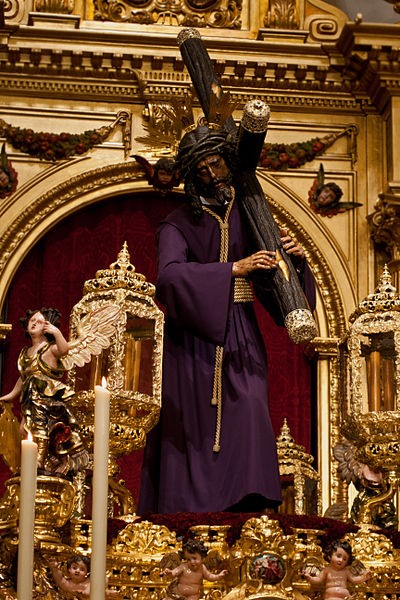
Preface
Abbreviated Sources
and References
Annotations: title,
epigraph and
dedication
Part I
Part II
Part III
III.1 Synopsis
pp. 723-732
III.2 Synopsis
pp. 733-768
III.3 Synopsis
pp. 769-791
pp. 792-823
III.4 Synopsis
pp. 824-855
III.5 Synopsis
pp. 856-878
pp. 879-900
Epilogue Synopsis
pp. 901-937
pp. 938-956![]()
III.3 pp. pages 792-823
792.1] Quién es?: "Who is it?"
794.40] the miracle at Bolsena: "According to the Church," writes Marsh, "the [fourteenth-century] miracle of Bolsena was performed to convince a skeptical priest, and though him his doubting brethren, of the reality of the transformation of the sacred elements. When he cut the consecrated wafer, blood flowed from the bread and stained the napkin on which it lay. The napkin, or corporale, with its yet visible stains of the divine blood, is alleged to be still preserved in the Cathedral of Orvieto, in which diocese Bolsena lies" (MMSM 49).
795.39] Stephan Asche: ash (Ger.: Asche) recalls the phoenix myth; see notes to 390.1, 700.3, 774.3.
796.37] Dies irae [...] in favilla: see 322.29 ff.
797.22] Alphonso del Gato: apparently a café or bar (cf. 802.24), and surely spelled Alfonso.
797.23] Francisco alegre: a 1948 song written by an Andalusian trio called Quintero, León, and Qiroga [MR]. A video with Spanish lyrics can be seen here: https://www.youtube.com/watch?v=Vv-pqV-ZgJI
797.36] feeling chilly and grown old: the last line of Browning's "A Toccata of Galuppi's" (see 193.12).
798.2] as the poet wrote, the natural in woman closely is allied to art: from the conclusion of the song of the Garden-girls in Goethe's Faust, Part Two (act 1, "A Spacious Hall"):
Garden-girls and fair to look on,
Fittingly we play our part;
For the natural in woman,
Closely is allied to art.
798.27] de couloir: Fr. "of the hallway."
800.8] Carnival [...] carne vale: the Latin carne vale ("flesh, farewell") was a folk etymology of "carnival" (see 428.2).
800.8] Ave carne! . . . Salve! . . . macte virtute esto!: Lat.: "Hail flesh! . . . Greetings! . . . good work [bravo]!"
800.10] Descartes [...] Larvatus prodeo [...] he kept a Salamander: cf. 96.21-23, where "he advanced masked" derives from "Larvatus prodeo." Maritain explains: "In the juvenilia of Descartes we find the phrase Larvatus prodeo. 'Like an actor wearing a mask, I come forward, masked, on the stage of the world.' [...] It will be for the masked philosopher to unmask the sciences and to make their continuity and their unity appear with their beauty" (The Dream of Descartes, 41, 92 n.25). The phrase also refers to the precautions Descartes took not to offend the authorities with his new philosophical systems.
800.12] Copulo, ergo sum: Descartes's cogito, ergo sum altered to "I copulate, therefore I am."
800.12] Carne, O te felicem!: "O, you happy flesh!"
800.15] Stesichorus: (ca. 640-555 B.C.), Greek lyric poet. He wrote that Helen of Troy was a phantom created by Hera to instigate the Trojan War, while the real Helen remained in Egypt during the conflict; this is the story Euripides used in his Helen. Plato implies ("Phaedrus" 243)" that Stesichorus was blinded by Helen herself -- by then a goddess -- for this "slander." The anecdote is also related in Irenaeus's Against Heresies (1.23), where Simon Magus's prostitute-consort is said to be Helen's avatar.
800.27] Jesús del Gran Poder: "Jesus of the Great Power”: a wooden sculpture in Sevilla, carved by Juan de Mesa in 1620.

801.22] sliding down between the casks: cf. Faust riding a wine cask in Goethe's "Auerbach's Tavern" episode.
802.1] five Jones brothers [...] Los cinco-jones: the joke is a pun: Los cinco Jones looks and sounds like los sin cojones ("Those without balls").
802.28] Cien iguales me quedan: "I have a hundred of the same left."
802.41] juerga: a drinking party.
802.44] Pastora: Sp. "shepherdess." Originally, Gaddis intended Wyatt to have a daughter by Pastora, and in the illegitimate daughter to be "at last redeemed through love" (Gaddis's notes, quoted in Koenig's "'Splinters of the Yew Tree,'" 36). Although there are hints about a child later (and see 897.16 ff. and 900.3-6), Gaddis decided that such a redemption would be dishonest and facile.
803.24] Krishna seduced sixteen thousand maidens: an anecdote first recorded in the Bhagavata Purana and repeated elsewhere in Indian literature and art.
803.28] They let the path stay dirty: see 28.44.
804.3] Déjame! [...] Déjale!: "Leave me! [...] Leave!"
804.6] Hoy los nobios se van a casar: "Today the sweethearts [should be novios] are going to get married" - the first line of "La Tani" (see 771.27); line 12 below is the chorus.
804.12] No sale la cuenta porque falta un churumbel: see 813.11-16 below.
804.17] Me quieres? [...] Yo te quiero y tu no me queires: "Do you love me? [...] I love you but you don't love me."
804.23] Vámonos: "Let's go."
804.24] Vida! . . . Cielo! . . . no termina . . . mi vida! . . . Vamos hacer un niño: "Life! . . . Heaven! . . . don't stop . . . my life! . . . Let's make a baby!"
804.34] Me quieres? . . . Díme lo, aunque no es verdad!: "Do you love me? . . . Tell me so, even if it's not true!" Cf. Esther's plea at 117.41-42.
805.8] Vaya Usted con Diós: Good-bye; but see 821.38 ff.
805.36] a picture of Adelita Beltrán: perhaps this one:

805.38] La Sebastiana: see 822.16-21.
805.39] La Zarza Mora: another song by Quintero, León, and Qiroga; see/hear it here: https://www.youtube.com/watch?v=6dCJDk_e1iw
810.27] Point d'argent, point de Suisse: Fr.: "No money, no Swiss [soldiers]" - a saying from the Renaissance conveying the commercial attutude of Swiss mercenaries: they were willing to serve anyone who paid them, but abandoned their employers the moment they ran out of money.
810.31] aber die jüngste [...] Sonne selber: see 273.14 ff.
811.3] Allí se mueren [...] allí se mueren: "Then they die. [...] Not in winter, but when the leaves return to the trees, then they die" (see 813.19, .23-24).
815.40] Somebody's said that going to sea is the best substitute for suicide: so says Ishmael in the first chapter of Melville's Moby-Dick.
816.20] Herr von Falkenberg: see 770.30.
818.39] Un extranjero [...] un falsificador: "A foreigner, see, a North American, you know . . ." "Why?" [asked in Italian] "Sure, look, a North American . . ." "Why?" [...] "Yes sir, a counterfeiter, get me? A North American, you know, a counterfeiter."
819.4] mozo: Sp.: young man; colloquially, guy, fellow.
820.37] Calderón's La Vida es Sueño [...] "El delito mayor del hombre es haber nacido": Life Is a Dream, a tragicomedy of ethics and intrigue by Spanish dramatist Pedro Calderón de la Barca (1600-81), concerns the testing of heir-apparent Sigismundo for his suitability as King Basil's successor. Sigismundo was imprisoned at birth because the stars predicted his tyranny and cruelty, which he indeed fulfilled when allowed out of his cell. After this he was imprisoned again and was led to believe that his short-lived freedom was only a dream - hence the play's title. When released from his cell a second time, he is just and noble. The quoted line, used by Wyatt earlier (393.3-4), is from Sigismundo's first speech.
820.44] even the gods themselves, can't recall their gifts: see 335.15.
821.1] Quiere comer?: "Do you want to eat?" (from 771.39).
821.4] shelter to travelers [...] a god in disguise: Faust II (act 5, "Open Country") adapts Ovid's tale of the aged couple Philemon and Baucis, the only couple who offered shelter to Jupiter and Mercury when they traveled in disguise.
821.5] The whole family there, eating, the whole . . . all the family: Wyatt recalls his underlined passage from Thoreau (see 265.2-4).
822.10] Los turistas, sí . . . pero los marecones: "The tourists, yes . . . but the queers."
822.30] sereno: night porter.
823.33] the hag of the moon, the dark winnower: cf. Graves's suggestion "that the [White] Goddess was once worshipped at Moeltre [in Wales] in her triple capacity of white raiser, red reaper and dark winnower of grain" (WG 52-53).
home || e-mail
|| site search
William Gaddis: Life & Work || Tributes,
Obituaries, Memorials
The Recognitions
|| JR ||
Carpenter's Gothic || A Frolic of his Own
|| Agapé Agape essay
Gaddis Nonfiction ||
The
Gaddis Discussion List || Gaddis on the Web ||
Gaddis Remembered
A Gaddis
Bibliography || Gaddis in Fiction
|| The
Gaddis Annotations Project